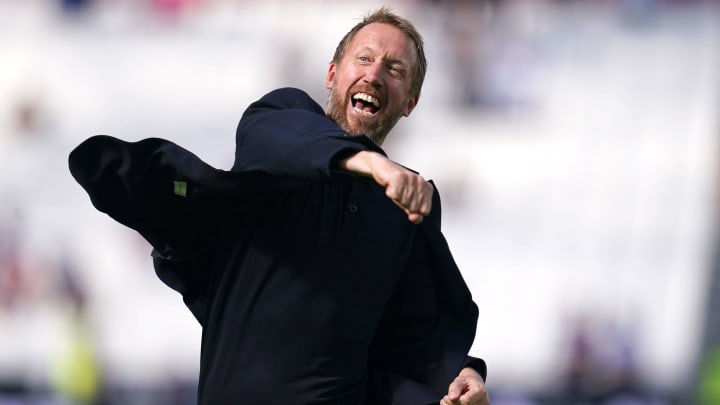Graham Potter’s Unique Ascent and the Challenge That Awaits at Chelsea

It has only been four years since Graham Potter left Östersund for Swansea City. Even amid the endless churn of the Premier League, his appointment as manager of Chelsea on a five-year contract, confirmed Thursday and just a day after Thomas Tuchel’s ouster, represents a remarkable, swift ascent.
Back then, Potter was seen as an oddity. He had been a journeyman fullback, making 320 league appearances, most for York City, Macclesfield Town, Stoke City and West Brom before completing a degree in social sciences at The Open University. His career path from then was quirky, bordering on the eccentric. Alongside roles in university football, he became technical director for Ghana at the Women’s World Cup in 2007. But it was after his move to Sweden in ’11 that things took off.
Östersund earned praise for its smart, passing football, and then for extraordinary overachievement given its budget. It won promotion to the Swedish top flight, won the Swedish Cup and got to the group stage of the Europa League. Yet still, in the U.K., Potter was regarded as something of an oddball, noted less for the quality of his on-pitch coaching than for having had his squad put on a performance of Swan Lake at a local theater. That was part of a series of cultural workshops he organized to encourage his players to grow as people. It’s safe to assume the likes of Pierre-Emerick Aubameyang and Ben Chilwell will not be expected to do anything similar.
But Potter’s methods clearly worked, and in 2018 he succeeded Carlos Carvalhal as manager of Swansea. Although the Swans finished only 10th in the Championship, Potter was widely seen as having been a success, something highlighted by a narrow 3–2 FA Cup defeat to reigning Premier League champion Manchester City. That was enough to earn a move to Brighton when Chris Hughton was dismissed in the summer of ’19.
Potter’s approach was very different to that of his cagey predecessor, and it took a little time for him to instill his methods. But after 15th- and 16th-place finishes in his first two seasons, last season Brighton finished ninth, one of only eight teams in the Premier League to finish with more wins than losses. Given its excellent expected goals total, there was a widespread sense that with a more ruthless center forward it could have gone even higher than that. This season began with a first-ever win away at Manchester United. Last week’s 5–2 victory over Leicester City lifted Brighton to fourth place—all that despite having sold key figures Marc Cucurella (Chelsea), Yves Bissouma (Tottenham) and Neal Maupay (Everton) in the summer.
And that, of course, is part of the sadness of Potter’s move. For any smaller club, success is a double-edged sword, as its best players and its manager will be poached by richer, usually worse-run clubs. Modern football is no longer a world in which clever minnows can be inspired to greatness by a visionary manager; their riches are just swallowed by the elite as surely and thoughtlessly as plankton are eaten by whales.
And it may also be a problem for Potter at Chelsea. In one sense it’s heartening that the traditional pathways to the top still exist. It is still possible for a manager to impress at a smaller club, lift it to mid-table and then progress to one of the giants; not all the elite managers are arriving from Bayern, Ajax or Paris Saint-Germain. But the job of Brighton manager is very different to that of Chelsea manager.
Potter has adapted from his Östersund days. The theatrical performances are no more, but there will have to be further adaptation to Chelsea and the egos of its stars. At Brighton he had almost complete buy-in from players who had been signed with his style of football in mind; at Chelsea, he has a squad largely shaped by Tuchel (although it now appears that at least some players may have been foisted on him by owner Todd Boehly, while friction over the club’s desire to sign Cristiano Ronaldo and Anthony Gordon was at least part of the reason Tuchel was ousted). It took two years for Potter to get it right at Brighton; he is unlikely to be afforded that much time by Chelsea.
And then there is the Boehly issue. If he is, as appears to be the case, a de facto sporting director easily impressed by celebrity and one who struggled to understand Tuchel’s technocratic approach, the suspicion is that there is not going to be the same harmony, the same sense of club and manager pulling in the same direction, as what existed for Potter at Brighton, no matter Boehly’s statement on Thursday.
“We are thrilled to bring Graham to Chelsea. He is a proven coach and an innovator in the Premier League who fits our vision for the club,” he said. “Not only is he extremely talented on the pitch, he has skills and capabilities that extend beyond the pitch which will make Chelsea a more successful club. He has had a major impact at his previous clubs and we look forward to his positive impact at Chelsea. We look forward to supporting him, his coaching team and the squad in realizing their full potential in the coming months and years.”
So for Potter and for Chelsea this is an exciting move, one filled with potential for both a bright manager on the rise and his new club—but it is not one that comes risk- or doubt-free.
More Soccer Coverage:

An accomplished author of multiple books, Jonathan Wilson is one of the world’s preeminent minds on soccer tactics and history.